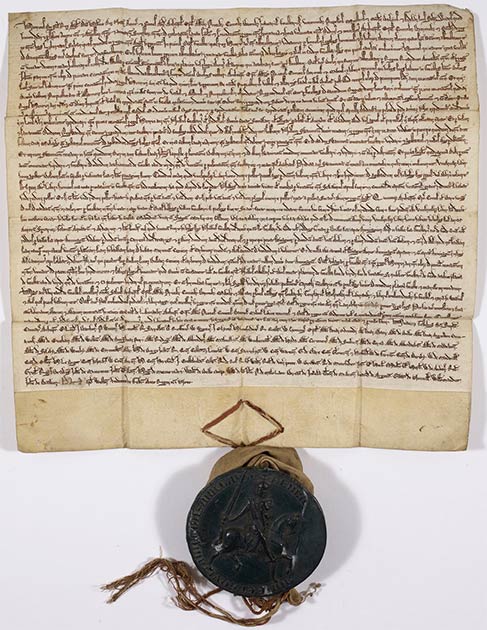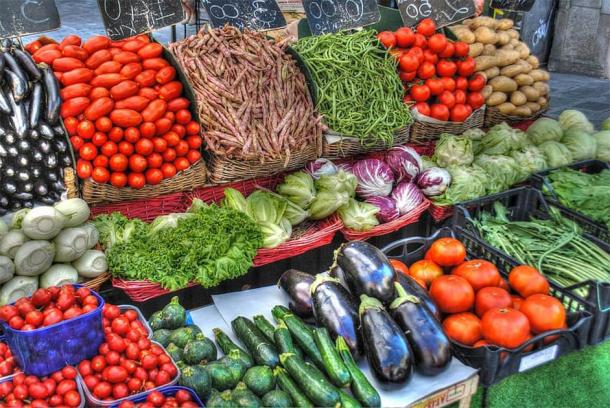English law is riddled with ancient entries and charters pertaining to past worlds; and from time to time they emerge and catch out the unsuspecting. For example, it’s punishable to gamble in a public library in England and it is also illegal to enter the House of Parliament wearing a suit of armor, and, according to the Fact Site , it’s still legal to shoot a Scotsman “under certain circumstances.”
Now, a charter signed by King Henry III in 1227 AD prohibiting the opening of any market within “six and two-thirds miles (10.8km)” of nearby Loughborough has caused a startup market selling vegetables, bread, and flowers in the parking lot of The Free Trade Inn in Sileby, Leicestershire, to lockdown – during lockdown.

Coronation of King Henry III. ( Public Domain )
The Ancient Charter That is Crushing a Modern Trader
The Borough of Charnwood is a local government district in the north of Leicestershire, England. According to the BBC, in order to try and protect the town’s market, Charnwood Borough Council shut down a nearby market that popped up during the lockdown. The rival market in Sileby, a village about 8 km (5 miles) outside Loughborough, was the recent idea of villager Steve Smith, the owner of SR Fruits, who now runs nine stalls.
Charnwood Borough Council was struggling to find a legal method to close the rival marketeer down and this led them to produce the ancient English charter that was originally granted to the Lord of the Manor in Loughborough in 1221 AD (reconfirmed in 1227). It grants the holder of the charter, now the council, to “take action against rival markets set up nearby.”

The Charter of the Forest, 1217, held by the British Library. ( Public Domain )
A Double-Headed Governmental Legal Dragon
From the outside, this all sounds like a heavy-handed governmental institution bullying an innovative entrepreneur, but for 800 years the charter has stopped illegal, unregistered, street traders setting up anywhere in the county. Mr. Smith told the media that he fully understands this. However, in his defense, Mr. Smith also told the BBC that “during this pandemic surely they’ve (Charnwood Borough Council) got to use common sense – people don’t want to travel on buses.” Mr. Smith played a solid “Covid-19 wild card” – and following that he laid down a thundering emotional plea saying that “shutting it for good would be devastating for the village.”
Somewhat amplifying Mr. Smith’s cause, the BBC article showed photographs of the market at The Free Trade Inn in Sileby opening last Tuesday for “what could be its last time, with queues of people waiting to get in.” Charnwood Borough Council said it has told stallholders to pause trading, so the situation has been reviewed, but a local petition has already gathered 900 signatures. And while the council said it would “work with” the market organizers (Mr. Smith) it would “not allow it to carry on in its current form over concerns about its size and the types of stalls.”
And there it is folks; it looks like the council will win in the end for they had a secret legal weapon up their sleeve. Had Mr. Smith’s lawyer’s managed to wriggle him out of the ancient charter, the councilors were ready to get him with the wolves: health and safety officers. This makes it all perfectly clear that there will be little “assessing of this situation” to be done and that they want Mr. Smith’s market closed down, once and for all, by the looks of it.
However, while the council said they “admire local entrepreneurs working for and in their communities,” they are required to “balance this” by safeguarding Loughborough market’s ancient Royal Charter from competition from across the borough.
When Does Balancing Become Control?
When I was in high school we were taught in economics that a “free market” is a system in which goods and services are valued and self-regulated by fluxes in the open market and by consumers. It was always the case that in a free market the laws and forces of supply and demand existed “free” from all forms of economic privilege, monopolies, and perhaps most importantly “government intervention.” Therefore, perhaps Mr. Smith needs to “go for the jugular” of his vastly more resourceful enemy and have his lawyers build a case that the council are “intervening” in supply and demand , and “restricting trade” to protect one sector of a local economy, essentially forbidding the local market to find a price equilibrium, which is against the ultimate goal of a real free market.
But all things considered, even though we are in a lockdown and eating vegetables and fruits is a great way to bolster your immune system , traditions and laws must be maintained – for without those there is nothing for a free market to stand on. And, while Mr. Smith must be commended for getting out there and risking his own life to “make a few bob,” there are many smaller market stall owners in Loughborough who will be patting their council’s back for being so clever as to use an ancient royal charter to save the little trade that might be left after lockdown.

The 1227 charter has prohibited a startup market from operating in Leicestershire. ( Public Domain )
So, in conclusion, as usual, it’s all about perspective – and here we have perfect evidence that every story always has two sides, and also that some of the most ancient legal charters ever written can have two lives.
Top Image: A market has been closed down by a law on an 800-year-old charter. Source: Dmytro Surkov
/ Adobe Stock ; Inset, Charter of the Forest ( Public Domain )
By Ashley Cowie
Related posts:
Views: 0
 RSS Feed
RSS Feed

















 August 12th, 2020
August 12th, 2020  Awake Goy
Awake Goy  Posted in
Posted in  Tags:
Tags: 
















